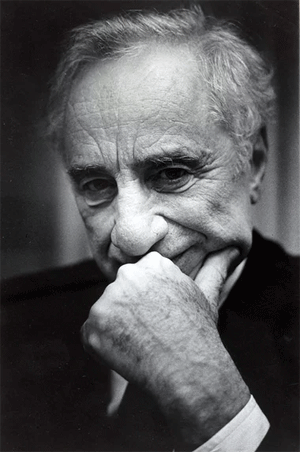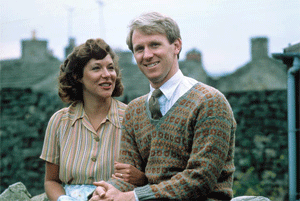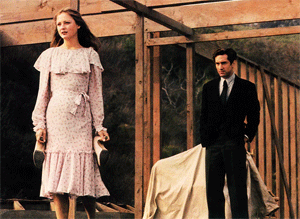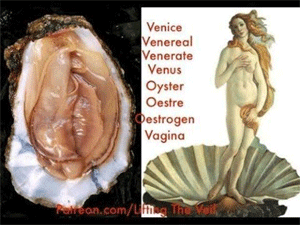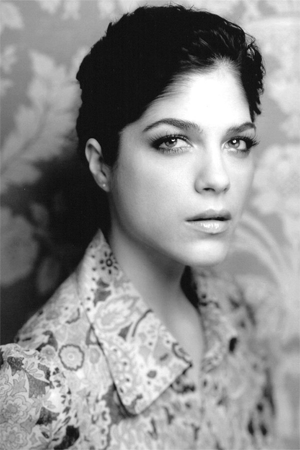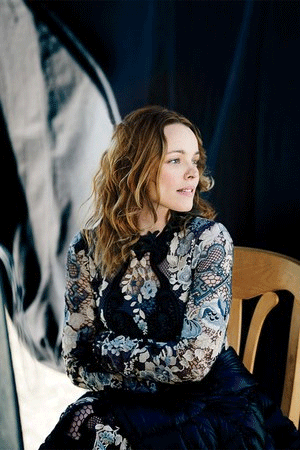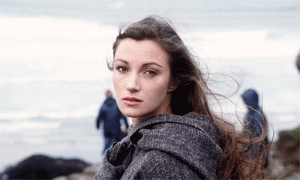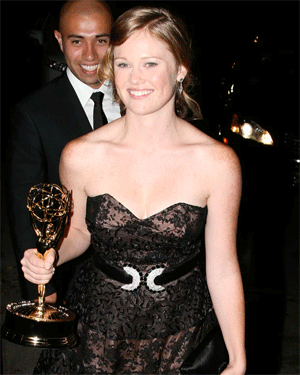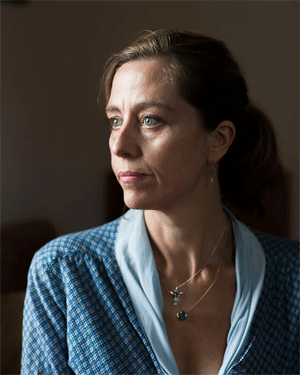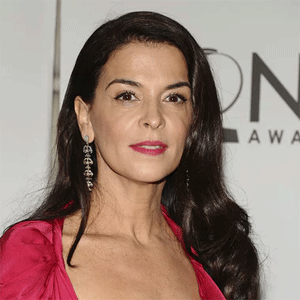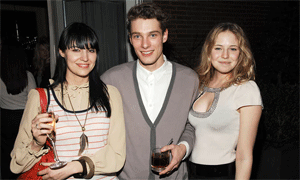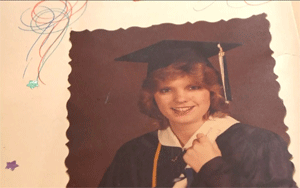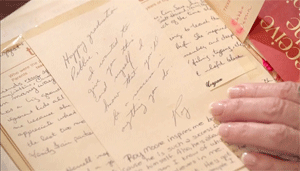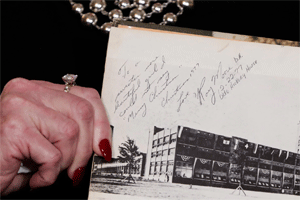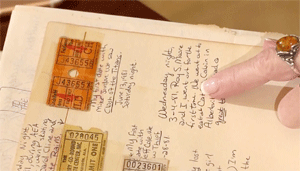by Katie Nicholl and Laura Collins
UPDATED: 04:52 EST, 27 January 2017
NOTICE: THIS WORK MAY BE PROTECTED BY COPYRIGHT
YOU ARE REQUIRED TO READ THE COPYRIGHT NOTICE AT THIS LINK BEFORE YOU READ THE FOLLOWING WORK, THAT IS AVAILABLE SOLELY FOR PRIVATE STUDY, SCHOLARSHIP OR RESEARCH PURSUANT TO 17 U.S.C. SECTION 107 AND 108. IN THE EVENT THAT THE LIBRARY DETERMINES THAT UNLAWFUL COPYING OF THIS WORK HAS OCCURRED, THE LIBRARY HAS THE RIGHT TO BLOCK THE I.P. ADDRESS AT WHICH THE UNLAWFUL COPYING APPEARED TO HAVE OCCURRED. THANK YOU FOR RESPECTING THE RIGHTS OF COPYRIGHT OWNERS.

Charlotte, as she is today, escaped Hollywood and now leads a 'normal life' bringing up her son in London
It has been a long time since Charlotte Lewis held a crowd enthralled in Hollywood.
But if she ever dreamed of a return to Los Angeles, where as a young actress she was hailed as a ‘golden child’ – talented, exquisitely beautiful and with a film career unfurling before her – it would never have been like this.
On Friday, Charlotte, now 42, called a Press conference in Los Angeles to claim that director Roman Polanski, the man who gave her her first break, had abused her, ‘in the worst possible way’ when she was just 16 years old.
Polanski is currently under house arrest in Gstaad in Switzerland under threat of extradition to America to face charges of an alleged rape of a 13-year-old in 1977.
His alleged victim, Samantha Geimer, has said she has no desire to see him stand trial as she simply wants to get on with the life she subsequently built.
But 27 years after their first meeting, Charlotte feels very differently. She wants him to ‘get what he deserves’, she says and has given a statement to prosecutors in Los Angeles.
Now, in an exclusive interview with The Mail on Sunday, Charlotte explains why she has chosen to speak up now – against not just Polanski, but against Hollywood itself.
She says: ‘I know I should have gone to the relevant authorities at the time but I was scared and ashamed. I somehow thought it was my fault.
‘I’ve been so angry with some of the people in Hollywood who have spoken out in support of Polanski. Hollywood is giving the wrong message to paedophiles.
'He sexually abused me and manipulated me in the worst way. He has scarred me and the experience has definitely put a strain on my life.
‘I was recently engaged to a lovely man, but I would often clam up physically and I don’t think I’m very good in relationships. I will never forgive Polanski for what he has done to me.’
Charlotte had only just turned 16 when she first encountered Polanski. She had left school at 15 and by her own admission thought she was ‘pretty grown-up and street smart’ at the time. Looking back, she recognises that, though she may have been precocious and ambitious, she was anything but.
She had no acting experience but knew that she wanted her future to lie in film.
She modelled a bit while she searched for her big chance and, in 1983, she got it when a mutual acquaintance, 23-year-old model Eliza Karen, asked her to come with her to Paris to audition for a role in Polanski’s film Pirates.
Polanski had fled to the French capital five years earlier to escape the American courts over the Geimer case.
Charlotte recalls: ‘We had come over to Paris on the boat with not much money so that I could meet Roman. I was with Eliza, a friend of his. She was also a model and a couple of years older than me.
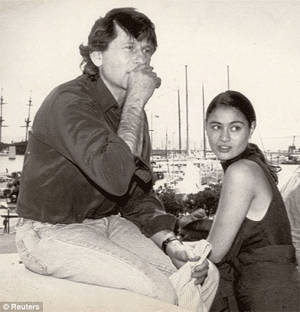
Vulnerable: Charlotte and Polanski launch the Pirates film at the 1986 Cannes film festival
‘She had put me up for a part in Roman’s new film. Apparently he wanted someone exotic-looking and because of my Hispanic look he wanted to see me. I didn’t know at the time, but I later found out that they had already found a French actress to play the role so I don’t know why he still wanted to see me.
‘We had checked into a hotel which was pretty central and very reasonable but when we told Roman where we were staying he said the hotel was not good enough and invited us to stay in his spare penthouse on the Avenue Montaigne, which seemed like a great offer.’
That night the girls went straight to Roman’s house for pre-dinner drinks. The first thing Polanski did on seeing Charlotte was to frame her face with his hands, as if shooting her through a camera. She felt uncomfortable, she now admits, but given the purpose of their meeting this in itself could hardly be described as odd.
She says: ‘The very first thing he asked me was, “How old are you?”I told him I was 16, but only just. This was in September and I had turned 16 that August.’
After dinner Polanski checked the girls out of the hotel room that he had dismissed as substandard and took them back to his apartment. While her friend retired to a neighbouring flat, Charlotte stayed chatting with the director on the sofa in his living room.

Fugitive: Roman Polanski, now 76, is facing extradition to America
‘We were drinking Moet and Chandon, I’ll never forget that, and I still can’t drink that champagne to this day. He told me he wanted me to stay the night with him and then he made a pass at me. He tried to kiss me and touch my breasts. I pulled away and told him that I had a boyfriend, which wasn’t true. It was an excuse, but he didn’t care.
‘He just said very coldly, “If you’re not a big enough girl to have sex with me, you’re not big enough to do the screen-test. I must sleep with every actress that I work with, that’s how I get to know them, how I mould them.”
‘I was shocked and got very upset and started to cry. I said I didn’t want to sleep with him, he was 50 and I found him disgusting.’
But as she recalls this today, Charlotte admits that she felt conflicted. ‘I saw this opportunity slipping away,’ she says softly.
‘My mother who had been working as a legal secretary had just been made redundant and although I was doing a lot of modelling I didn’t have a lot of money. I saw this film as my chance to make it. All these things were going through my head and I was getting more and more upset. I told him I didn’t want to sleep with him and I left.
‘I went to the other flat to see my friend and tell her what had happened.’
Charlotte says that, in her naivety and confusion, she became concerned that she was letting a professional opportunity of a lifetime pass her by, so returned to the director’s apartment.
‘Roman opened the door and led me to the bedroom,’ she recalls.
She has described exactly what she alleges happened next to the Los Angeles’ prosecutors, who are expected to investigate.
Charlotte says that the following morning, Polanski invited her and Eliza to join him for breakfast in his living room, and she accepted. She says now: ‘All I remember was wanting a bath. I needed to clean myself and I went to get fresh clothes.
‘After breakfast he wanted to show us the Mona Lisa so he took us to the Louvre and some other museums in the centre. We had lunch, then I went back with him to his apartment to collect my things as I was flying back to London that afternoon. I don’t know where Eliza was, I can’t remember.’
She claims that a further incident took place before she left for home.
Some might find it difficult to square her allegations of an ordeal that she claims was terrifying with her decision to return to Paris two weeks later for the Pirates screen test. But she did return and she got the part that would launch her career.
‘I never told my mother what had happened,’ she said. ‘I was just too ashamed. I needed to do this movie, the money was good – I was being paid £1,200 a month. My mother and I were living in housing association accommodation and this was a life-changing amount of money.’
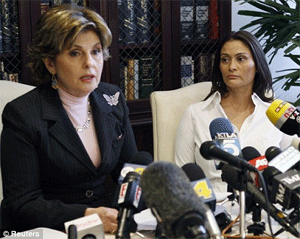
Speaking out: Actress Charlotte Lewis, right, with her lawyer Gloria Allred at the Los Angeles press conference
Charlotte’s Irish mother raised her alone and the actress never knew the Iraqi-Chilean father to whom she owes her looks. Speaking in a promotional interview for the film in 1986, Polanski himself said of Charlotte: ‘She had what I needed for the film. Dark hair, dark eyes – and the look of innocence.’
Back then Charlotte spoke of the experience of filming as a ‘nightmare’.
‘Polanski tried to dominate me right from the start,’ she said. ‘He swore at me and shouted at me. There was such pressure on me that I became a nervous wreck.’
Today Charlotte recalls: ‘The mental abuse started as soon as I started filming. I always felt that as soon as I started the movie he wanted to fire me.
‘I developed a serious eating disorder. He would play mind games with me and tell me I was too fat and then too thin. I developed bulimia and lost so much weight I passed out five times during filming.
I had turned 17 and Roman had been told by the producer Tarak Ben Ammar and MGM to stay away from me. I was very alone. They wouldn’t allow me to have an agent. Roman continued to emotionally bully me and would joke to other people onset that I was frigid.
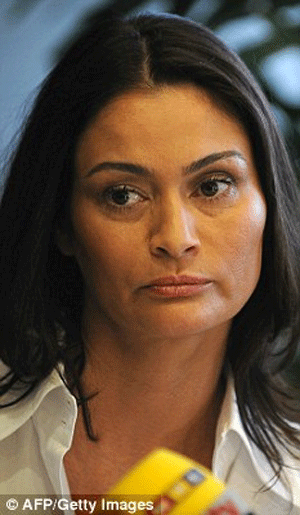
Scared: Charlotte says she is angry at the reaction of some people in Hollywood who support Polanski
‘I remember he made a bet once with a very famous American male actor that there was no way he could get me into bed because I was so cold and frigid. The producer flew my mother out to Tunisia [where Pirates was filmed] and I remember her hating Polanski. She said he had dead eyes.’
But though little has changed in how she remembers the miserable process of filming itself, her version of what happened between her and Polanski on a physical level has altered with the years.
In 1986 Charlotte claimed: ‘I found him very attractive, I’d love to have had a romantic relationship with him – and a physical one. You can’t help falling in love with him. But he didn’t want me that way.’
Though it is worth noting that at the time she was speaking she was still working for Polanski and, it could be argued, in thrall of him.
Today she says: ‘There was nothing about him I could have found physically attractive. He was short and stout and very strong.’
In another interview in 1999 Charlotte went on to claim that she did have a relationship with Polanski. But that it started after she had been cast in the film and when she was 17.
‘I wanted him probably more than he wanted me,’ she said then, claiming that they were lovers for six months in an affair that ended only when they began filming Pirates in Tunisia. She claimed afterwards that she’d been misquoted.
Ultimately this case must come down to one person’s word against another’s. Charlotte did not keep in touch with Eliza, the one person who could corroborate her account and, despite The Mail on Sunday’s strenuous attempts, we have been unable to trace her.
What is clear is that what Charlotte had hoped would be the start of a great Hollywood dream, instead set her on a path that led ultimately to addiction and despair.
Following her appearance in Pirates, Charlotte was hailed the new Nastassja Kinski – a former protege of Polanski who is said to have started an affair with him at the age of 15. Charlotte split her time between the UK – where she had a long-running role in Grange Hill – and Hollywood, where she starred opposite Eddie Murphy in The Golden Child in 1986.
She eventually moved to America and was swiftly linked with astring of eligible A-listers and hell-raisers, including Charlie Sheen and Mickey Rourke.
Professionally her star was on the rise but personally she was in serious trouble.‘Living in Los Angeles is like being at one long party,’ she later admitted. ‘It’s difficult to get away from it. I got to the stage where I was wondering, “What is the point of living here?” All I have is temptation.’
But she never lived up to her early film promise and in 1997, 14 years after she met Polanski, Charlotte returned to Britain and checked into the Priory to be treated for cocaine addiction. She had tried to give it up twice already, she said, but only ever in a ‘half-hearted’ way.
She tried to resurrect her career but whatever attraction Hollywood had held seemed to have gone.
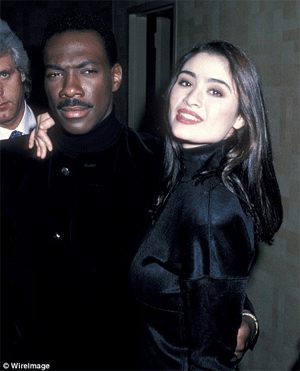
Rising star: Charlotte starred alongside Eddie Murphy in The Golden Child in 1986
Eight years ago she quit acting for good and today she says: 'I am happy but it’s true to say I have never been able to have a normal relationship with a man. I have spoken to my vicar and my GP about this and I am now having counselling.’
Charlotte has many reasons for speaking out now but money is not one of them and she has not been paid for this interview.
Instead, she insists, her abiding desire is simply to tell the truth that she has concealed for so long.
Last summer she made two trips to Paris and tried to contact Polanski. She says: ‘I wanted to see him. I wanted him to apologise. But he was away making a movie.
‘I’d heard that Polanski’s daughter had turned 16 and if I could ask him one question it would be, “How would you feel if this was your daughter?”
‘I will never forgive Polanski,’ Charlotte says as tears threaten to fall. ‘I’ll never know if my life would have been different had this not happened. There needs to be some justice. I’m telling the truth and Roman knows I’m telling the truth.’
Mr Polanski declined to comment last night.


